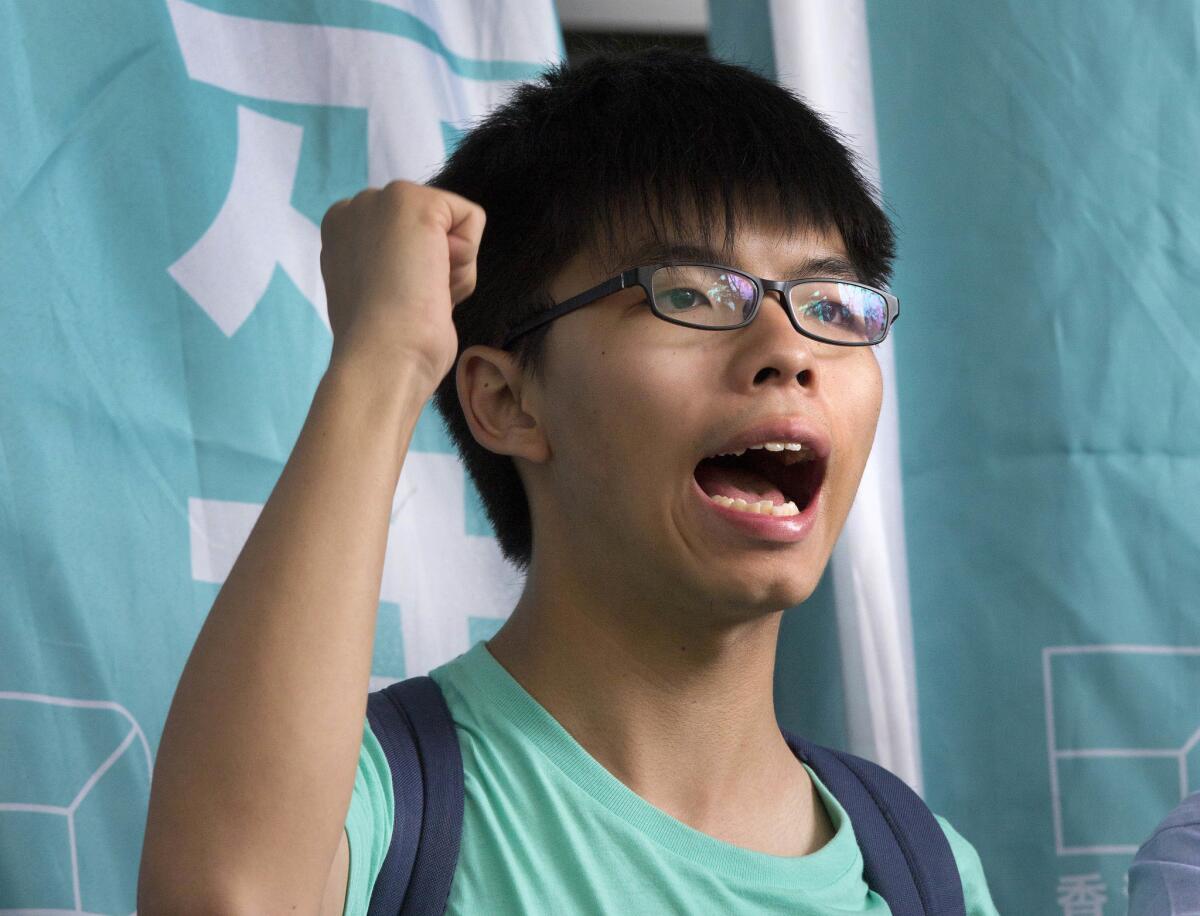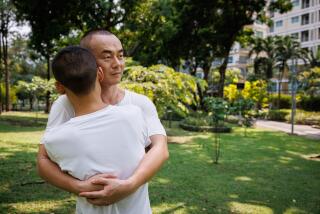Hong Kong democracy activist Joshua Wong refused entry to Thailand

- Share via
Reporting from Hong Kong — Acting under apparent pressure from China, authorities in Thailand on Tuesday detained Joshua Wong, the teenage face of the youthful pro-democracy movement in Hong Kong.
Wong, 19, arrived in Bangkok’s Suvarnabhumi Airport shortly before midnight and was immediately taken into custody, according to a statement from Demosisto, the political party he co-founded in April.
Thai authorities deported Wong about 12 hours later back to Hong Kong.
At a brief appearance upon return to Hong Kong airport Wednesday, Wong said that upon arriving in Bangkok he had been taken away by about 20 police officers from the tarmac straight to a holding cell inside the airport.
“They said, ‘We’ll not give you any explanation,’” Wong said. “You’ve been blacklisted.”
He said Thai authorities had denied his request to reach his family and attorney.
The activist had been invited by student leader Netiwit Chotipatpaisal to speak at Thailand’s Chulalongkorn University in commemoration of the 40th anniversary of a brutal crackdown on student protesters by the military, a sensitive topic in the country.
“He was invited there to speak about Hong Kong’s Umbrella Movement and the ongoing push for self-determination,” said Nathan Law, an incoming city legislator from Demosisto.
In its statement, the Demosisto party said it had been informed by Chotipatpaisal that Thai authorities “received a letter from the Chinese government earlier regarding Wong’s visit.”
The Chinese foreign ministry in a brief statement said only that Chinese authorities were aware of Wong’s detention and that they respected Thailand’s ability to manage the entrance of people into the country “in accordance with law.”
Thailand has taken a sharp turn toward authoritarianism under its ruling junta, which toppled a democratically elected government on May 22, 2014, ending months of street protests. It has also forced closer military and economic ties with China, drawing criticism from the U.S., its longtime ally.
China is Thailand’s largest trading partner, spending billions a year on food, raw materials and manufactured goods from the country.
The two countries have also stepped up joint military exercises and in July closed a deal for Thailand to purchase three Chinese submarines for $1 billion.
In July 2015, Thai authorities deported more than 100 Uighur refugees who had come from China, a move that drew international condemnation. The Turkic-speaking Muslim minority has long complained of cultural and religious suppression under Chinese rule, but Beijing blames Uighur separatists for bombings and stabbings in Xinjiang in the country’s far west.
In October 2015, a mainland China-born Swedish publisher who ran a book business in Hong Kong was abducted from the Thai resort city of Pattaya by Chinese agents and secretly taken to the Chinese mainland, where he has remained in detention pending trial.
Student leader Chotipatpaisal, a self-proclaimed conscientious objector who has refused to submit to conscription, said in a recent interview with Hong Kong’s South China Morning Post that he had hoped to use Wong’s example to inspire a massive pro-democracy protest akin to the 2014 Umbrella Movement in Hong Kong.
Last month, Wong and two others were spared jail time for their involvement in the protests but were sentenced to community service.
Hong Kong, a former British colony of 7.3 million people which is now a semiautonomous Chinese territory, has maintained an independent judiciary under a separate constitution.
The territory’s justice secretary, Rimsky Yuen, who has sought to sentence Wong to jail for his involvement in the 2014 protests, was scheduled to visit Thailand Wednesday.
Wong, who has been maligned by China’s state media as a secret agent trained by the CIA, is no stranger to detention by governments hostile to civil disobedience. He posted a selfie on his Facebook page from the gate before boarding his flight to Bangkok and recalled his treatment at the hands of Malaysian authorities, who had expelled him on the grounds of “endangering national security.”
“I’m a bit worried if I’ll get the green light this time,” Wong wrote in his post. “It’s obvious the Thai government has been siding with the Communist Chinese regime.”
Law, a special correspondent, reported from Hong Kong, and Kaiman reported from Beijing. The Associated Press contributed to this report.
Follow @JRKaiman on Twitter
MORE WORLD NEWS
Hurricane Matthew pummels Haiti and Cuba on route toward U.S.
America’s best idea may now be China’s, too, as it expands national park system
American football is gaining traction in China
UPDATES:
1:50 a.m.: The story was updated with Wong’s statement upon returning to Hong Kong.
1:35 a.m.: This story was updated with news that Wong has been refused entry to Thailand and put on a plane back to Hong Kong.
This story was originally published at 9:10 p.m.
More to Read
Sign up for Essential California
The most important California stories and recommendations in your inbox every morning.
You may occasionally receive promotional content from the Los Angeles Times.









